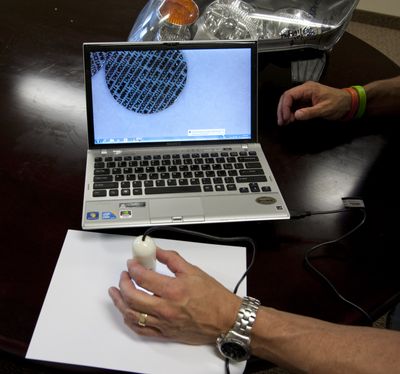CopDots help keep tabs on property

For a city recently ranked fourth in the nation for car thefts, calling property crime a hot-button issue might be an understatement.
Brent McLaws’ technology company, with its U.S. headquarters in the Hillyard neighborhood, is looking to curb the numbers.
DataDot Technologies, originally based in Australia, takes the technology used by the gaming industry to mark poker chips and uses it for vehicles. A joint venture of the company and its marketing partner is producing CopDots, further adapting the technology for individual consumers.
Similar to putting a microchip in a pet, CopDots allow owners to add inconspicuous identifiers to vehicles and personal items.
To mark an entire vehicle with the identifying dots costs between $200 to $500. The half-millimeter dots are applied using a spray can for full coverage. That application method is sold to vehicle manufacturers.
A package of 50 single CopDots applications costs about $30 and comes in a tube about the size of a penlight.
“This enables the consumer, the citizen, to be able to protect their own property individually without the same expense,” CopDots business developer Michael Whetstone said.
The dots do not have GPS capabilities, but rather a unique number code that can be traced to its owner. An adhesive attaches the dots to the item; the adhesive shows up under a black light so law enforcement can find the dots.
Whetstone said a criminal could take the time to use a black light to find the adhesive and pick off all the dots, but it takes time and it would be easy to miss one. In Australia, he said, the dots are just as much a deterrent as they are an identity marker.
When law enforcement or a pawn shop recovers a marked item, a quick scan with a black light finds the CopDots, and a scanner, provided to police departments by the CopDots company, magnifies the code on a computer screen for identification.
When consumers buy CopDots, they register their property on the company’s website and can report it stolen through the site as well as to law enforcement.
They aren’t yet for sale in Eastern Washington, however, as the technology requires a partnership with local law enforcement.
Whetstone said the company is currently in the process of marketing the product locally but has had success in Western Washington and Florida, where it is available at Lowe’s home stores.
Spokane police spokeswoman Monique Cotton said the department is aware of the CopDots program, but because the technology is new – the company’s consumer sales side opened last year – the agency has not committed to using it.
Cotton added the department is willing to look at all opportunities to reduce crime, which could include CopDots.
McLaws said the concept has taken off on other continents because the country or region as a whole got on board with the program.
“In Australia, there’s strong government backing,” McLaws said. “The government supports the police department and provides the necessary direction to say, ‘Cars have to be marked with something.’ ”
Whetstone said the technology has benefited consumers who can both deter criminals from stealing their items and can more easily recover them, as well as the police departments that are able to return stolen goods to their rightful owners.
“It’s new, I think it’s smart, I think it’s cost-effective,” Whetstone said. “It’s brought the people and the cops together.”